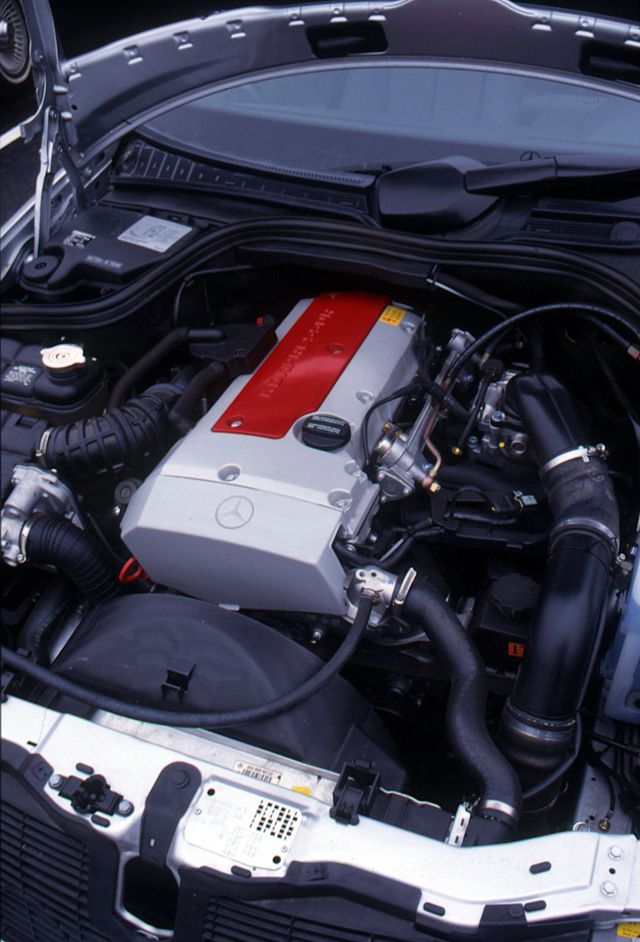1999 Mercedes-Benz C230 Kompressor Proves a Little K Goes a Long Way

From the March 1999 issue of Car and Driver.
What do a cherry-red SLK230 and a base C-class sedan have in common?” asked an Acura salesman in Ohio. “One’s a roadster, the other’s a toaster.” This caused him to bend double in a fit of laughter. Ha, ha. Get it? Neither did we, but we think he’s referring to the C-class’s styling or its age or both. When the salesman first saw our C230K, he said, “Hey, look, it’s the little K,” not to be confused with the Big K, which has something to do with a Kmart marketing scheme.
Mercedes-Benz currently offers three C-class sedans. There’s the over-the-top C43 AMG, producing 302 horsepower and costing, ahem, $54,651. There’s the $36,207 C280 with a 194-hp V-6. And there’s the base car depicted here, with a DOHC 2.3-liter four-banger. This year, the four is intercooled and supercharged—the “K” stands for Kompressor—raising its output from 1998’s 148 hp (and 162 pound-feet of torque) to 1999’s 185 hp (and 200 lb-ft).
The base C230K ($31,795) now also includes standard-equipment traction control (previously a $990 option), leather seating inserts, and brake assist (which helps timid drivers summon ABS during emergencies in the Big K’s parking lot).
T. W. Benjamin|Car and Driver
Our test car was fitted with the optional $890 Sport package—16-inch Continental ContiSport Contacts (which sounds like a rough Euro iteration of croquet that requires helmets), beautiful six-spoke alloy wheels, more aggressive seat bolsters, firmer suspension calibrations, and a load of faux carbon-fiber trim scattered around the cockpit. That trim, plus the gray seats and black dash, comprise an interior more austere than Henry Hyde’s shoes.
But forget about that. Is the C230K ballsier than the sedan it replaces? You bet your polished wingtips. Sixty mph now looms large in only 7.6 seconds, a 1.2-second improvement over the last four-cylinder C-class we tested, a 1994 C220, and a margin the C230K maintains throughout the quarter-mile. In fact, the car is only 0.4 second slower to 60 mph than an SLK roadster, and—holy smokes—is 0.3 quicker to 60 than the last C280 V-6 we tested.
The engine pulls eagerly from 2500 to 4800 rpm, through which range it produces peak torque, and the five-speed automatic clicks off flawlessly smooth wide-open-throttle upshifts.

T. W. Benjamin|Car and Driver
There is, however, a downside to this newfound thrust. Although the Kompressor doesn’t sound as tractorish as it does in the SLK, it still emits a coarse, gruff, low-pitched grumbling that is far from satisfying. Beyond 5000 rpm, the racket becomes downright intrusive and, at one frequency, actually sets the sun visors to buzzing like a pair of deranged June bugs. Moreover, on cold mornings, this engine balks and stalls if asked to move the car before an appropriate idle is negotiated. And the idle quality—even when everything’s as warm as, well, a toaster—never approaches that of the four-cylinder smoothies in, say, a Toyota Camry or a Honda Accord.
In our myriad drives in C-class Benzes, we’ve voiced some recurring beefs. The back seat is so cramped that, when three adults climb back there, some sort of accidental ménage á trois is inevitable. The recirculating-ball steering is somewhat leaden and heavy on center, making the car feel less nimble than it actually is. There’s that infernal single wiper blade. The ride, at least with the Sport shocks and springs, is borderline harsh on Michigan roads. And now there’s this: The engine requires premium fuel.
Let’s face it. In a seven-car comparo in 1994, a C220 finished, ah, seventh. And in another seven-car comparo last July, a C280 finished fifth.
Of course, there are also Mercedes traits we consistently cherish and champion: A rigid platform. An unequal-length control-arm front suspension that is as adept on the skidpad as in emergency-lane-change maneuvers. No-nonsense ergonomics. High resale value. And absolutely spectacular brakes. To halt from 70 mph, the C230K requires less asphalt than a Chevy Camaro Z28.
More C-class Reviews From the Archive
Unfortunately, the C-class sedans are five years old, and the phrase “It just gets better with age”—which, you’ll have noticed in life, applies to almost nothing—does not obtain here, either.
Just for starters, the C230K faces the six-cylinder Audi A4 and BMW 328i—cosmic blockbusters that, in acceleration, luxury, ride, styling, handling, steering, and sound levels, leave the C230K looking like, well, toast. Our advice? If a C-class sedan is your goal in life, wait for the all-new models, slated to appear in May 2000.
Arrow pointing downArrow pointing down
Specifications
Specifications
1999 Mercedes-Benz 230 Kompressor
Vehicle Type: front-engine, rear-wheel-drive, 5-passenger, 4-door sedan
PRICE
Base/As Tested: $31,795/$32,685
ENGINE
supercharged and intercooled DOHC 16-valve inline-4, iron block and aluminum head, port fuel injection
Displacement: 140 in3, 2295 cm3
Power: 185 hp @ 5300 rpm
Torque: 200 lb-ft @ 2500 rpm
TRANSMISSION
5-speed automatic
DIMENSIONS
Wheelbase: 105.9 in
Length: 177.4 in
Curb Weight: 3258 lb
C/D TEST RESULTS
60 mph: 7.6 sec
1/4-Mile: 15.7 sec @ 89 mph
100 mph: 21.0 sec
Rolling Start, 5–60 mph: 7.9 sec
Top Speed (gov ltd): 133 mph
Braking, 70–0 mph: 171 ft
Roadholding, 300-ft Skidpad: 0.81 g
EPA FUEL ECONOMY
City: 21 mpg
C/D TESTING EXPLAINED







